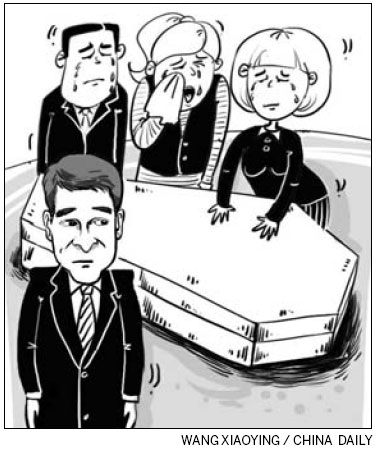No more deadlines but tears remain for former colleague
Updated: 2011-11-29 07:53
By John Clark (China Daily)
|
|||||||||
 |
I was brought up in the British, stiff upper lip style.
Emotion isn't something you display in public.
Scrape your knee and your mother was likely to tell you: "Big boys don't cry".
So, you can imagine that I was unprepared for the outpouring of public grief at a Chinese funeral.
I should explain: My editorial team leader died recently after a short illness. He was 31.

The news was so unexpected that it left us all shocked and upset. A female colleague burst into tears and cried piteously at her desk.
Somehow we got through the day's work. The next day was the funeral. About 30 people boarded the bus for the 45-minute trip to an industrial-size crematorium, next to a cement works, in Beijing.
Now, I've been to funerals before in the United Kingdom and have seen funeral parties waiting their time slot for a funeral parlor in Glasgow.
Here there seemed to be dozens of parlors and a series of processions of people carrying gigantic wreaths of flowers.
We took up our position on either side of the path leading to the funeral parlor, work colleagues on one side, friends and family on the other.
Funeral staff, who looked like marines in their smart, military-style uniforms, escorted the coffin.
When we entered the parlor we saw our dear colleague lying in an open coffin surrounded by flowers. More floral tributes lined the walls.
Our big boss stepped forward to deliver a eulogy and was soon in tears. She carried on, in Chinese of course, but at the end said in English: "There will be no more deadlines for you in heaven."
Next came a long-term colleague who also dissolved in tears but carried on with her speech despite being almost overcome by emotion.
Then a close friend of the dead man paid tribute, weeping openly as he spoke. Grief is contagious. Men and women were now sobbing uncontrollably.
Finally, the man's mother, supported between two women, addressed her son in his coffin. Of course, I don't know what she or the others said.
But I could feel the pain of their loss. At one point, the mother almost collapsed and had to be held up. But she carried on with her impassioned speech until one of the uniformed staff indicated she should finish.
We were invited to step forward to each lay a white rose on the casket. Our dead colleague looked as if he was taking a nap.
At the end of the service I walked away from the funeral parlor stunned at the outpouring of emotion.
In the UK, families grieve privately and then try to hold it together and not break down at a funeral.
Here in China it would seem that grieving is a public affair. It strikes me that it is more cathartic to cry your eyes out than try to keep it bottled up for fear of embarrassment, which is what many of us do in the West.
Afterwards, a Chinese colleague told me that the lamenting at the funeral had been restrained by Chinese standards. In some rural areas, she said, people used to be paid to mourn noisily.
This struck me like something out of novel by Charles Dickens. But we have all seen on TV scenes of grief-stricken people in Gaza and the West Bank, in Afghanistan, Iraq and the relatives of victims of terrorist bombings around the world. Chinese grief is no different.
I realized that it's the uptight, reserved British way of mourning that is out of step with the rest of the world.
It was our newspaper's production day. We were bussed back to the office to resume work. No more deadlines for our former colleague, but we had to pull together to put the newspaper to bed.
The boss invited the team to go out for dinner after work. We relaxed, smiled, joked. There was no mention of the funeral or our poor colleague.
Enough sorrow had been shed already. We needed a break.











